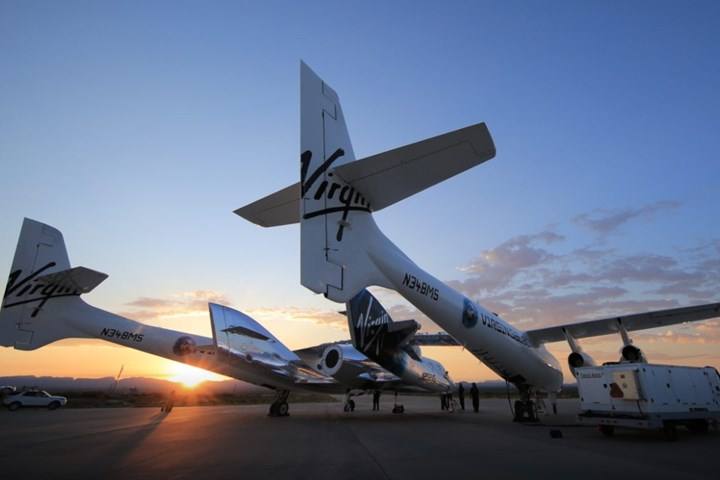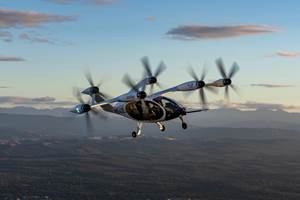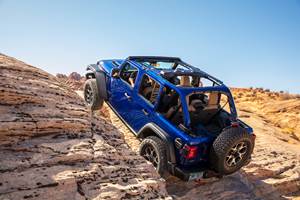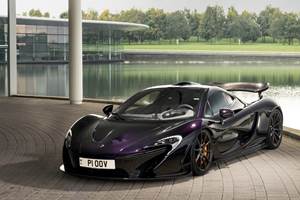SpaceShip Two prepares for first spaceflight
Virgin Galactic prepares its vehicles, pilots, team and facilities with rigorous pre-flight checks and objectives before the flight which will be carried out later this fall.

Photo Credit: Virgin Galactic
Virgin Galactic Holdings Inc. (Mojave, Calif., U.S.) reported on Oct. 14 that the company is preparing for the SpaceShipTwo’s first spaceflight from its operational base at Spaceport America (Las Cruces, N.M., U.S.) (see “SpaceShip Two completes second test flight”). Occurring later this fall, the flight will be crewed by two pilots and carry several research payloads (which are part of the NASA Flight Opportunities Program) in the cabin of VSS Unity. In these final preparations, Virgin Galactic says it is working through a number of rigorous steps to prepare the vehicles, pilots, team and facilities, ensuring that safety remains a top priority.
To ensure the pilots are well-prepared for the flight test objectives about to be conducted, Virgin Galactic notes the significant amount of training that has occurred in the company’s ground-based simulator, both with its own pilots, and those in sessions that are linked to the mission control room. Another training tool for the pilots included Virgin Galactic’s mothership vehicle, VMS Eve.
“VMS Eve has the ability to test pilot proficiency by simulating the glide and approach-to-land phase up flight for SpaceShip Two pilots,” chief pilot Dave Mackay explains. “The cockpit structure of Eve is almost identical to that of Unity: the same pilot seats and windows, as well as very similar flight controls and instruments. This, coupled with the fact that that with VMS Eve’s landing gear down, and one set of speed brakes out, it descends on the same flight path angle as SpaceShip Two, means that the crew can practice the identical approach and landing pattern to the one they will fly in Unity. This makes Eve a very valuable in-flight simulator.”
Virgin Galactic say preparing VSS Unity for flight also includes a “practice run” for the spaceship, as well as for the pilots and teams in mission control. This pre-flight check will put Unity through its paces on the ground by testing all systems prior to take-off to ensure functionality. This includes raising the feather, swinging the landing gear, firing the reaction control thrusters and sweeping the flight control systems through their full range of motion.
Further, with this flight being Virgin Galactic’s first spaceflight from Spaceport America, it reports that it has planned a full rehearsal of its spaceship propellant landing procedure. During this rehearsal, the company says it will perform a full tanking test, loading high-pressure helium and nitrous oxide into their respective spaceship tanks on-board VSS Unity. This particular rehearsal will provide the teams the opportunity to review the end-to-end execution of every step in the flight process to Spaceport.
Consistent with how Virgin Galactic conducted VSS Unity’s glide flights earlier this year, the company says all operations are following a set of stringent operational protocols that include changes to the work areas and procedures to enforce social distancing and universal mask usage, as advised by state guidelines.
Reporting it is still on track to meet its timeframe, Virgin Galactic expects its first spaceflight to occur later this fall. In September, the company disclosed, via its application for a multi-year Federal Communications Commission (FCC) license, that October 22, 2020, would be the opening of the company’s flight planning window. The company also says it includes preliminary test flight dates for its mothership, VMS Eve. While preparations are going well, Virgin Galactic states that it is not yet at the stage where it can confirm specific planned flight dates for either the VSS Unity or VMS Eve test flights.
Related Content
Plant tour: Joby Aviation, Marina, Calif., U.S.
As the advanced air mobility market begins to take shape, market leader Joby Aviation works to industrialize composites manufacturing for its first-generation, composites-intensive, all-electric air taxi.
Read MoreJeep all-composite roof receivers achieve steel performance at low mass
Ultrashort carbon fiber/PPA replaces steel on rooftop brackets to hold Jeep soft tops, hardtops.
Read MoreWelding is not bonding
Discussion of the issues in our understanding of thermoplastic composite welded structures and certification of the latest materials and welding technologies for future airframes.
Read MoreMcLaren celebrates 10 years of the McLaren P1 hybrid hypercar
Lightweight carbon fiber construction, Formula 1-inspired aerodynamics and high-performance hybrid powertrain technologies hallmark this hybrid vehicle, serve as a springboard for new race cars.
Read MoreRead Next
“Structured air” TPS safeguards composite structures
Powered by an 85% air/15% pure polyimide aerogel, Blueshift’s novel material system protects structures during transient thermal events from -200°C to beyond 2400°C for rockets, battery boxes and more.
Read MorePlant tour: Daher Shap’in TechCenter and composites production plant, Saint-Aignan-de-Grandlieu, France
Co-located R&D and production advance OOA thermosets, thermoplastics, welding, recycling and digital technologies for faster processing and certification of lighter, more sustainable composites.
Read MoreDeveloping bonded composite repair for ships, offshore units
Bureau Veritas and industry partners issue guidelines and pave the way for certification via StrengthBond Offshore project.
Read More

























